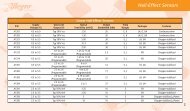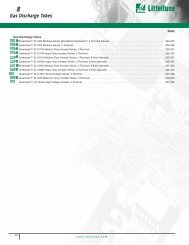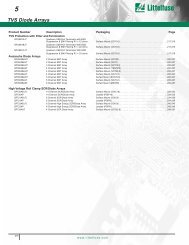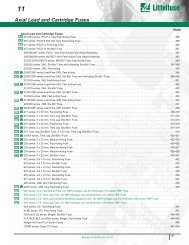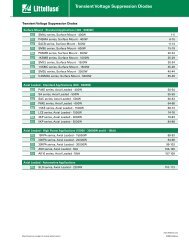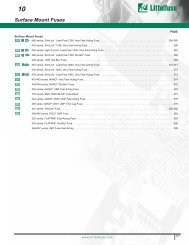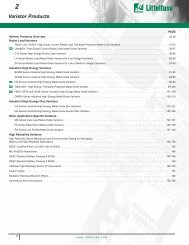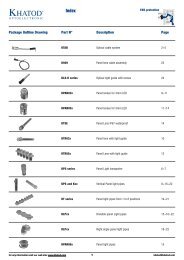ALUMINUM ELECTROLYTIC CAPACITORS
ALUMINUM ELECTROLYTIC CAPACITORS
ALUMINUM ELECTROLYTIC CAPACITORS
You also want an ePaper? Increase the reach of your titles
YUMPU automatically turns print PDFs into web optimized ePapers that Google loves.
Up grade!<br />
CONDUCTIVE POLYMER <strong>ALUMINUM</strong> SOLID <strong>CAPACITORS</strong> Radial Lead<br />
@Super low ESR, high temperature resistance and high ripple current capability<br />
@Rated voltage range : 2.5 to 16Vdc<br />
@Endurance : 2,000 hours at 105C<br />
@Suitable for DC-DC converters, voltage regulators and decoupling applications<br />
for computer motherboards<br />
@RoHS Compliant<br />
?SPECIFICATIONS<br />
Items<br />
Category<br />
Temperature Range<br />
Rated Voltage Range<br />
Capacitance Tolerance<br />
Surge Voltage<br />
Leakage Current<br />
*Note<br />
Dissipation Factor<br />
(tane)<br />
Low Temperature<br />
Characteristics<br />
(Max. Impedance Ratio)<br />
Endurance<br />
Bias Humidity Test<br />
Surge Voltage Test<br />
Failure Rate<br />
-55 to +105C<br />
?DIMENSIONS [mm]<br />
Characteristics<br />
2.5 to 16Vdc<br />
P20% (M)<br />
Rated voltageB1.15<br />
I=0.2CV (max.)<br />
Where, I : Leakage current (MA), C : Nominal capacitance (MF), V : Rated voltage (Vdc)<br />
(at 20C, 120Hz)<br />
(at 105C)<br />
(at 20C after 2 minutes)<br />
0.08 max. (FA5 size : 0.12max.)<br />
Z(-25C)/Z(+20C)[1.15<br />
Z(-55C)/Z(+20C)[1.25<br />
(at 20C, 120Hz)<br />
(at 100kHz)<br />
The following specifications shall be satisfied when the capacitors are restored to 20C after the rated voltage is applied for 2,000 hours<br />
at 105C.<br />
Appearance No significant damage<br />
Capacitance change [P20% of the initial value<br />
D.F. (tanE) [150% of the initial specified value<br />
ESR [150% of the initial specified value<br />
Leakage current [The initial specified value<br />
The following specifications shall be satisfied when the capacitors are restored to 20C after subjecting them to DC voltage at 60C,<br />
90 to 95% RH for 1,000 hours.<br />
Appearance No significant damage<br />
Capacitance change [P20% of the initial value<br />
D.F. (tanE) [150% of the initial specified value<br />
ESR [150% of the initial specified value<br />
Leakage current [The initial specified value<br />
The capacitors shall be subjected to 1,000 cycles each consisting of charge with the surge voltage specified at 105C for 30 seconds<br />
through a protective resistor(R=1kO) and discharge for 5 minutes 30 seconds.<br />
Appearance No significant damage<br />
Capacitance change [P20% of the initial value<br />
D.F. (tanE) [150% of the initial specified value<br />
ESR [150% of the initial specified value<br />
Leakage current [The initial specified value<br />
0.5% per 1,000 hours maximum (Confidence level 60% at 105C)<br />
*Note : If any doubt arises, measure the leakage current after the following voltage treatment.<br />
Voltage treatment : DC rated voltage is applied to the capacitors for 120 minutes at 105C.<br />
@Terminal Code : E<br />
FD+0.5max.<br />
Coated Case<br />
Fd<br />
L' 15min. 4min.<br />
FP0.5<br />
fD<br />
fd<br />
F<br />
fD'<br />
L'<br />
(1/2)<br />
6.3<br />
0.5<br />
2.5<br />
L+0.3max<br />
PSC<br />
PSA<br />
PS<br />
8 10<br />
0.8<br />
3.5 5.0<br />
FD+0.5max<br />
L+1.5max<br />
Low profile<br />
Lower ESR<br />
Lower ESR<br />
?MARKING<br />
EX) 4V560MF<br />
A 292<br />
560<br />
4 V<br />
CAT. No. E1001H



